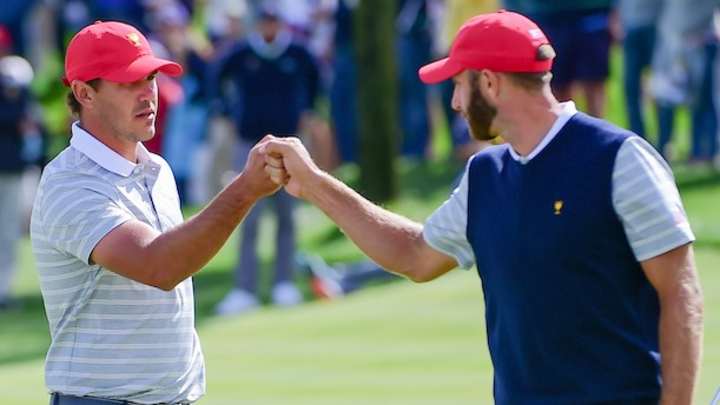Golf raises eyebrows as it lowers decorum

NORTON, Mass. – Professional golf has been held to a higher standard than other sports when it comes to calling out fellow competitors.
Maybe it’s because golf is the only sport in which the players traditionally have called penalties on themselves. Or, maybe it’s because golf is a sport in which a player, with the exception of match play, competes against the course.
Whatever the reason, professional golf has cultivated a more genteel atmosphere in which players typically don’t discuss competitors’ perceived shortcomings, but that all seems to be changing.
The most recent player-to-player scrap on the PGA Tour came two weeks ago, after the third round of the PGA Championship, when two-time defending champion Brooks Koepka called out 54-hole leader Dustin Johnson.
“When I've been in this position before, I've capitalized,” Koepka said. “I don't know; he's only won one [major championship]. I'm playing good. I don't know. We'll see.”
Koepka picked at a prominent blemish on Johnson’s resume, an 0-for-3 record in converting 54-hole leads into major championships.
Johnson extended the inglorious mark to 0-4, despite closing with a 2-under 68 at TPC Harding Park and finishing second to winner Collin Morikawa.
Johnson didn’t comment publicly after the PGA, and it wasn’t until Thursday here at TPC Boston, site of the FedEx Cup playoff opener the Northern Trust, that he offered a response.
“It doesn't matter,” Johnson said when asked about Koepka’s comments. “It doesn't bother me. He can think whatever he wants.”
The little tit-for-tat between Koepka and Johnson is just the latest example of players calling out others.
Bryson DeChambeau and Patrick Reed have taken shots from other players, some of which certainly were justified and others that maybe were not.
For DeChambeau, the consternation centered on his plodding pace of play, which has gotten better. For Reed, where do we start? The most recent hubbub came in December after his questionable actions in a waste area at the Hero World Challenge in the Bahamas. By setting the club behind the ball and taking it away a few times, thus removing sand behind the ball, he clearly improved his lie but then suggested that he was unaware of having taken any questionable actions.
“I know Pat pretty good, and he’s always been nice to me … but anyone cheating the rules, I’m not up for that,” Australian Cameron Smith said later that month, at the Presidents Cup. “I don’t have any sympathy for anyone that cheats.”
PGA Tour commissioner Jay Monahan considered the comments to be out of line and told Smith to zip it.
The Koepka-Johnson tiff, which involves two of the top-ranked players in the world, might not attract the commissioner’s attention yet, but it nonetheless demands a ruling from the broader fan base: Is golf losing its refined approach?
When asked about players calling out other players, Tiger Woods responded simply: “It’s sports.”
His answer might have been economical, but it says so much more. Golf always has been a competition that cultivates a different approach than do the other major sports. Now, it seems as if professional golfers feel the need to be flippant and even biting in comments about competitors, taking the game down the same road as the NFL, NBA, MLB and the NHL.
Is this a good thing? Does it make golf a better sport, or does it merely create fodder for the short attention span of social media?
DeChambeau, Johnson and Reed can say that they don’t care or it’s merely a detractor’s opinion, but at some point, these comments could manifest themselves in other ways.
Hopefully, that is far off, but in a year the likes of 2020, we have learned that anything is possible.
Sign up to receive the Morning Read newsletter, along with Where To Golf Next and The Equipment Insider.
